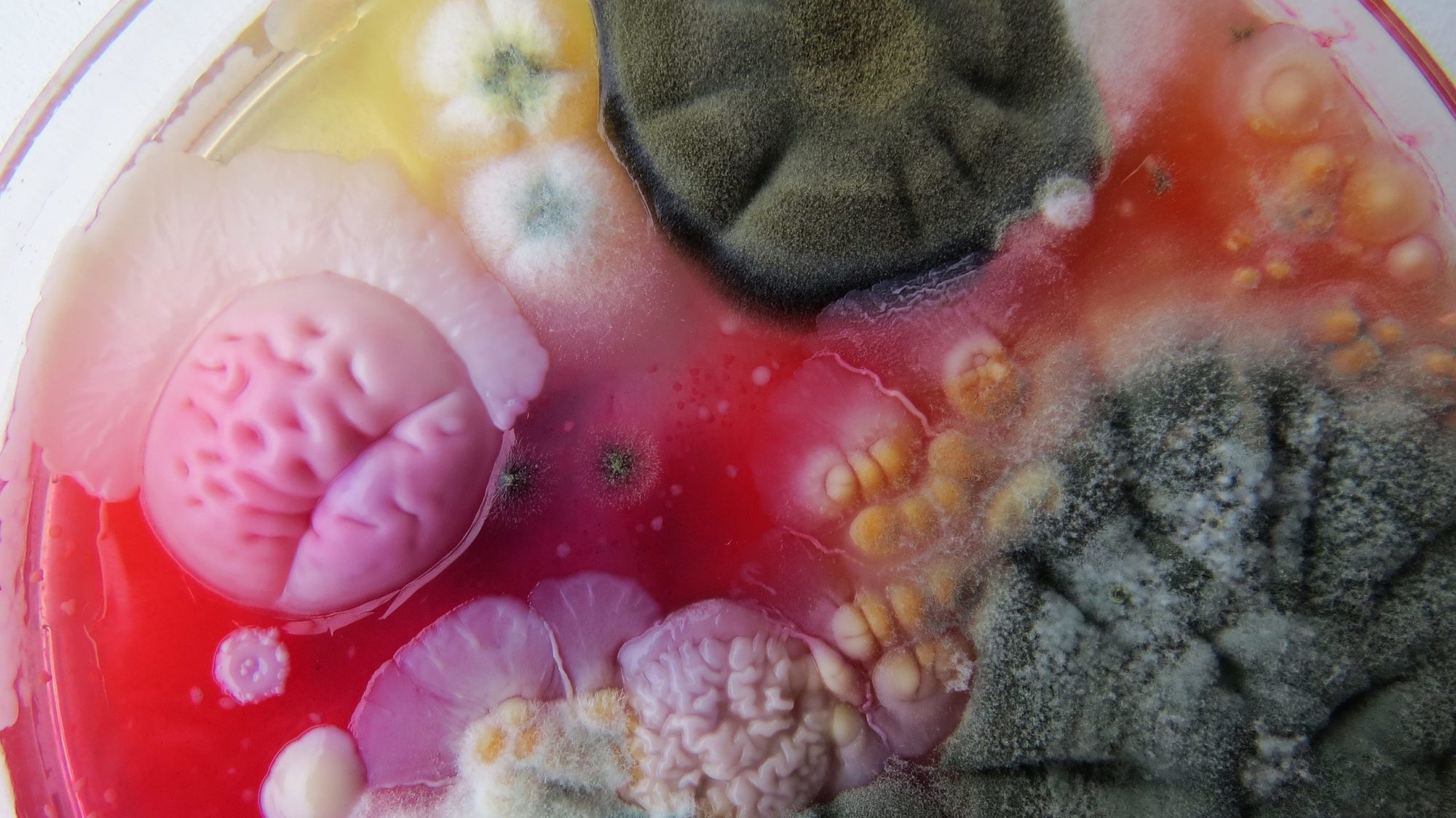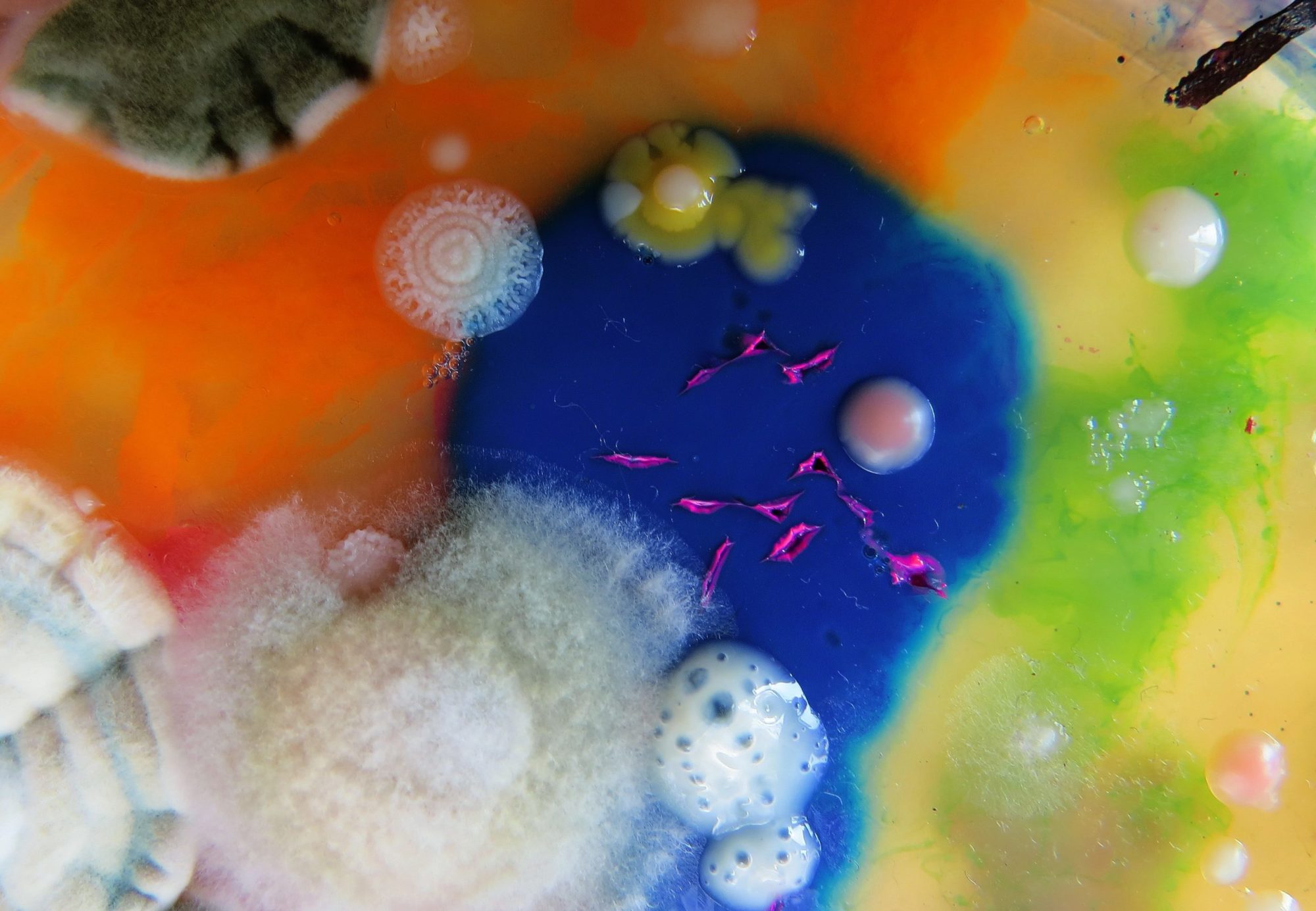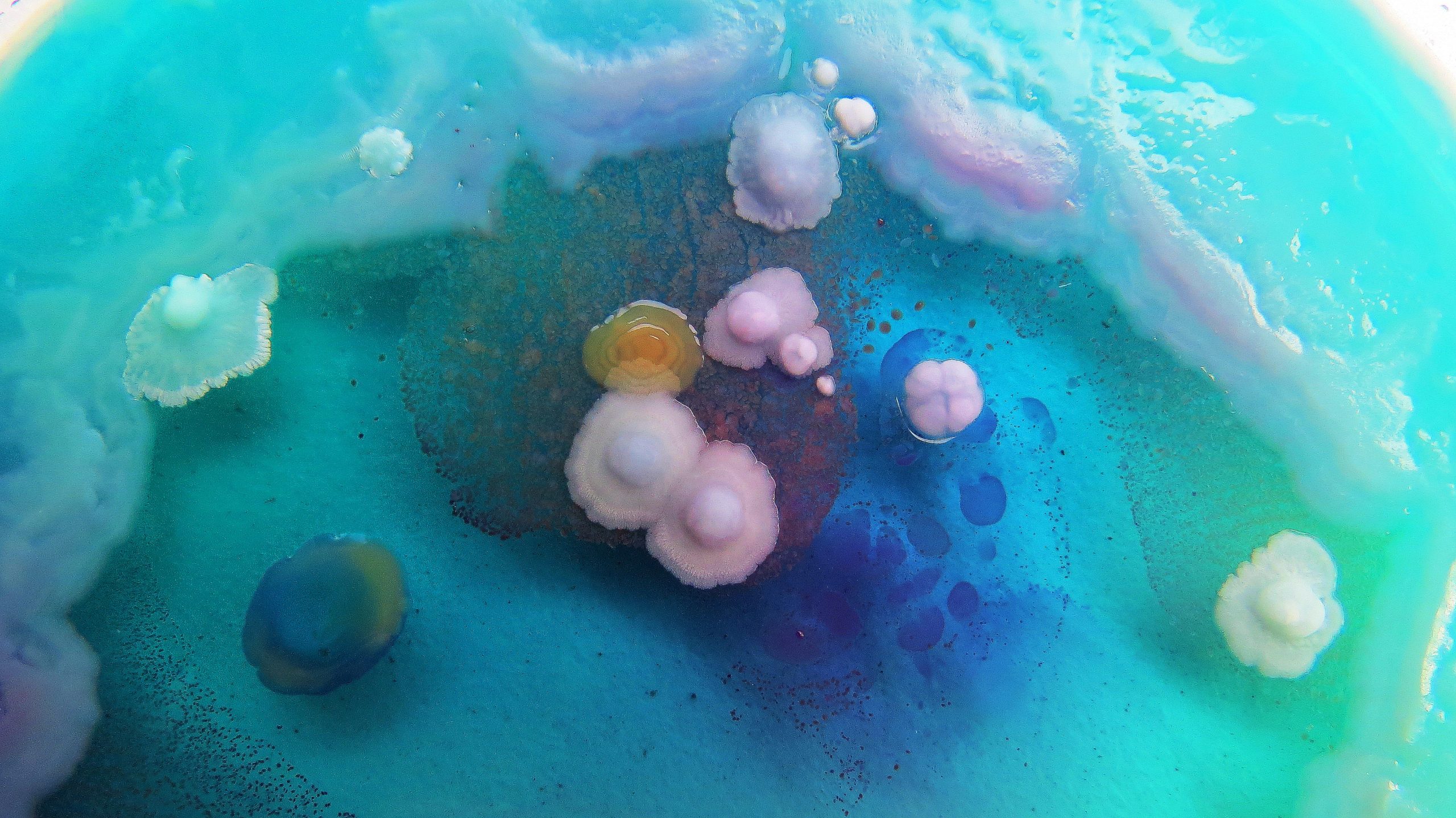I Will Not Be Purified

Dashaplesen, Bio abstractions (series), free seeding techniques (air and surrounding microbiome), artist’s nutrients, 7-20 days of incubations [courtesy of the artist]
Share:
You are infested with parasites. With Lyme spirochetes. With bacteria. We just need to kill them all off, and then you’ll feel clean, you’ll feel better. This was my doctors’ promise during the first year I was sick. Here, take one more drug. We will “clean you out.” Your gut is “leaky.” Your body is toxic. Your kidneys are full of heavy metals. Your brain is toxic. Your lymph nodes are swollen with snowmelt.
Anyone who has ever been life-threateningly ill will know the desperation it breeds. You’ll try anything. You’ll do anything. And when treatments fail, and doctors—shockingly unskilled in empathy—shrug and suggest this means you will die, you start looking anywhere for help. Rational orthodoxy fades, and you find yourself lying on a vibrating crystal in a room covered in purple velvet while a “shamanic healer” tells you that, first, you are a “martyred turtle of great significance,” and, second, you are unclean. You have karmic baggage. You are sludged with demons and darkness. Your illness is dirty. You are polluted. Biologically. Emotionally. Karmically.
This information came as no surprise to a survivor of early sexual abuse. “Yes,” I shuddered. Although I’d kept this a secret from my family and friends, here it was, showing up on a blood test, in my failing organs, in the perspicacious eyes of an energy healer, a psychic, a nutritionist. I had failed. There was no way to hide the contamination. Just like my “leaky” gut, the darkness was finally leaking out. “Yes,” I tearfully affirmed to my assortment of healers and doctors and guides. “Yes. I knew it. I knew I was contaminated. I have always been impure. Tell me, please. How can I live? How can I be purified of this illness that I obviously brought upon myself?”
The answer always costs money. A lot of money. And the answer was always packaged in white light, ascension, purification, in the chlorinated scrub of my gut, my blood, my body, and my soul. And when these treatments, spiritual and medical, not only failed but made me much sicker, the healers and doctors would send me a bill and say, You’re too sick for us to handle. Too dark. Too inflamed. You don’t want to get better.
Abandoned by medicine, manhandled by New Age healers, and doggedly set upon academic achievement at all costs, I decided to try to pull myself into another life. I just needed coping mechanisms to get through the pain, to live through an extra year, to finish the book I wanted to write, to put a Band-Aid on a mortal wound. I took matters into my own shaking hands, fully indoctrinated in purity jargon.
My gut biome was obliterated. Before a correct diagnosis of genetic connective tissue disease, years of antibiotic treatment had opened up too much real estate for monologuing pathogens. The doctors’ attempts to clean me had left me barren and vulnerable, as a tree farm is to fungus and wildfire. Plagued by life-threatening allergic reactions to food, with no recourse to a cure, I limited my diet again and again.
I looked to academics as a way of externalizing the success I could never somatically embody. Here were thin, severe men with ideas as knife-like as their countenances, who told me, Reject the shadows and walk out of the cave. Reject the body and prize the mind. Find the real forms. The sicker and thinner I became, the more my professors praised and fetishized my “perseverance” and “asceticism.”
Dashaplesen, Bio abstractions (series), free seeding techniques (air and surrounding microbiome), artist’s nutrients, 7-20 days of incubations [courtesy of the artist]
Years of talk therapy, and then a vulnerable plunge into Somatics and EMDR (Eye Movement Desensitization and Reprocessing), left me feeling similarly ragged. I showed up to every appointment. I paid ridiculous sums of money to therapists and psychologists who would say, If you work really hard, maybe we can “remove” these memories. We can complete them. You can move on. You can officially heal. When years of reliving pain, diving headfirst into putrefied wounds, failed to produce the joy I wanted so badly to inhabit, they would return to the refrain: Maybe you don’t want this. Maybe your illness, your sorrow, your PTSD is your fault. Maybe you don’t want to get clean. I was nuclear waste. The lightworkers said I was all shadow. The shamans said I was an underworld being. Too contaminated to handle. But, always, curiously, not too contaminated to bill for more and more money.
Mice raised in sterile labs without bacteria are dysfunctional. They are prone to disease, to anxiety, and to behaviors linked to schizophrenia. Research into gut biomes has shown that decreased biodiversity could contribute to depression, metabolic syndrome, and a host of other problems. Similarly, our attempts to blitz mosquitos, to clean our crops, and to sterilize the soil of pathogens has contributed to an agricultural and climate crisis.
Pathogens, it turns out, often constitute health. Soil without a microbial and fungal biome cannot sequester carbon, cannot grow nutritious food, and cannot, ultimately, support any life at all. We “clean up” forests in a simplistic attempt to prevent wildfires, and end up creating the conditions for the fires we are trying to prevent. The legacy of Plato’s Cave, in concert with monotheism’s demonization of embodiment, have created a spiritually sterile binary of light and dark, ascent and descent. This dualism is remarkably incompatible with the biodiversity of healthy ecosystems. And, worse, it lacks compassion for the ill, the bereaved, and survivors of abuse.
Dashaplesen, Bio abstractions (series), free seeding techniques (air and surrounding microbiome), artist’s nutrients, 7-20 days of incubations [courtesy of the artist]
What if your illness doesn’t have a cure? What if you can’t “remove” the memories of assault? What then? Will you never be pure enough? Light enough? Clean enough?
Scrub harder. Scrub your skin off. Scrub your shadows off. Scrub until you bleed. The turning point in my life came when I realized that the healthiest metaphor for me wasn’t light, or soap, or ascent. It was compost. It wasn’t clean, it was everything. Refuse. Dirt. Fungi. Bacteria. Water. Grubs. Worms. And remarkably, this mess was fertile. It made soil. It supported new green shoots. My gut didn’t need another dose of antifungal medication to remediate the problem created by antibiotics. Cleaning was killing me. I needed to compost my body. I needed to compost my spirit. I needed to add more microbes, more foods to my diet. The gut doesn’t want purity. It needs diversity—a little dirt, a little contamination—to thrive.
I needed to add herbal lore and Indigenous knowledge and folktales and children’s books and romance novels back into my philosophically sterilized worldview. I needed to approach psychological wounding, not with a scalpel and hydrogen peroxide, but with flowers and joy and laughter. I needed to overwhelm the pain, not try to rid myself of it. I didn’t need to “integrate” the abuse. I needed to place it softly into dark soil. I needed to say, “Okay. You’re nasty. But please make something grow.”
I’m much more interested in ensoilment than ensoulment. I want to have actual roots. I want my spirituality to have fur, pheromones, funk. I want it to live in a specific place. I want it to teach me how to be dynamically present and useful to my ecosystem. And I want to tell people that healing isn’t about completion. It isn’t about lightness. It’s about the mixing bowl where nothing is rejected, everything is included. In order to grow a garden, you need manure. You need compost. In order to heal the soil, you don’t clean it, you add to it: Fungi, ferment, bacteria, woodchips.
Researching Rabbi Jesus/Yeshua for an ecological reimagining of the gospels, I realized the folk magician’s real teaching was not purification. He even rejects John the Baptist’s water immersions. In a time when people were traumatized by Roman imperialism, diseased, and obsessed with purity rituals, he offered something radical. His offering was to brush off the question of purity: “Who cares? Come and eat with me. Come and share a meal.” He healed, not by cleaning but by including. Everyone was invited. No one was exiled.
I’m no longer trying to get clean. When I see healers prioritizing light over darkness, ascent over descent, purity over contaminated survival and flourishing biodiversity, I want to ask: When was the last time you consulted the land for advice? When was the last time you sat in the woods at night without a flashlight? When was the last time you invited everyone to the table?
Sophie Strand is a poet, historical-fiction writer, and essayist based in the Hudson Valley with a focus on the intersection of spirituality and ecology. Her first book of essays, The Flowering Wand: Lunar Kings, Lichenized Lovers, Transpecies Magicians, and Rhizomatic Harpists Heal the Masculine, is forthcoming from Sacred Planet Books (Inner Traditions). Her writing has been published by Dark Mountain, Poetry.org, Unearthed, Braided Way Magazine, Creatrix Magazine, and Your Impossible Voice. You can continue to follow her work and poetry on Facebook or Instagram: @cosmogyny.

